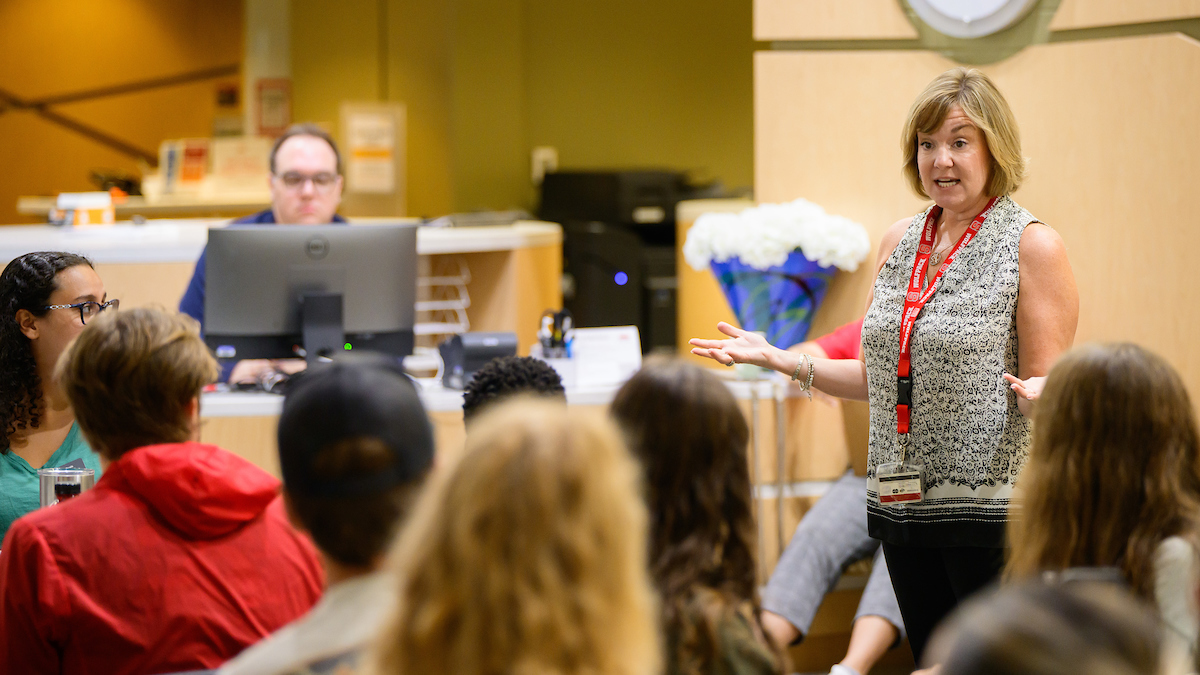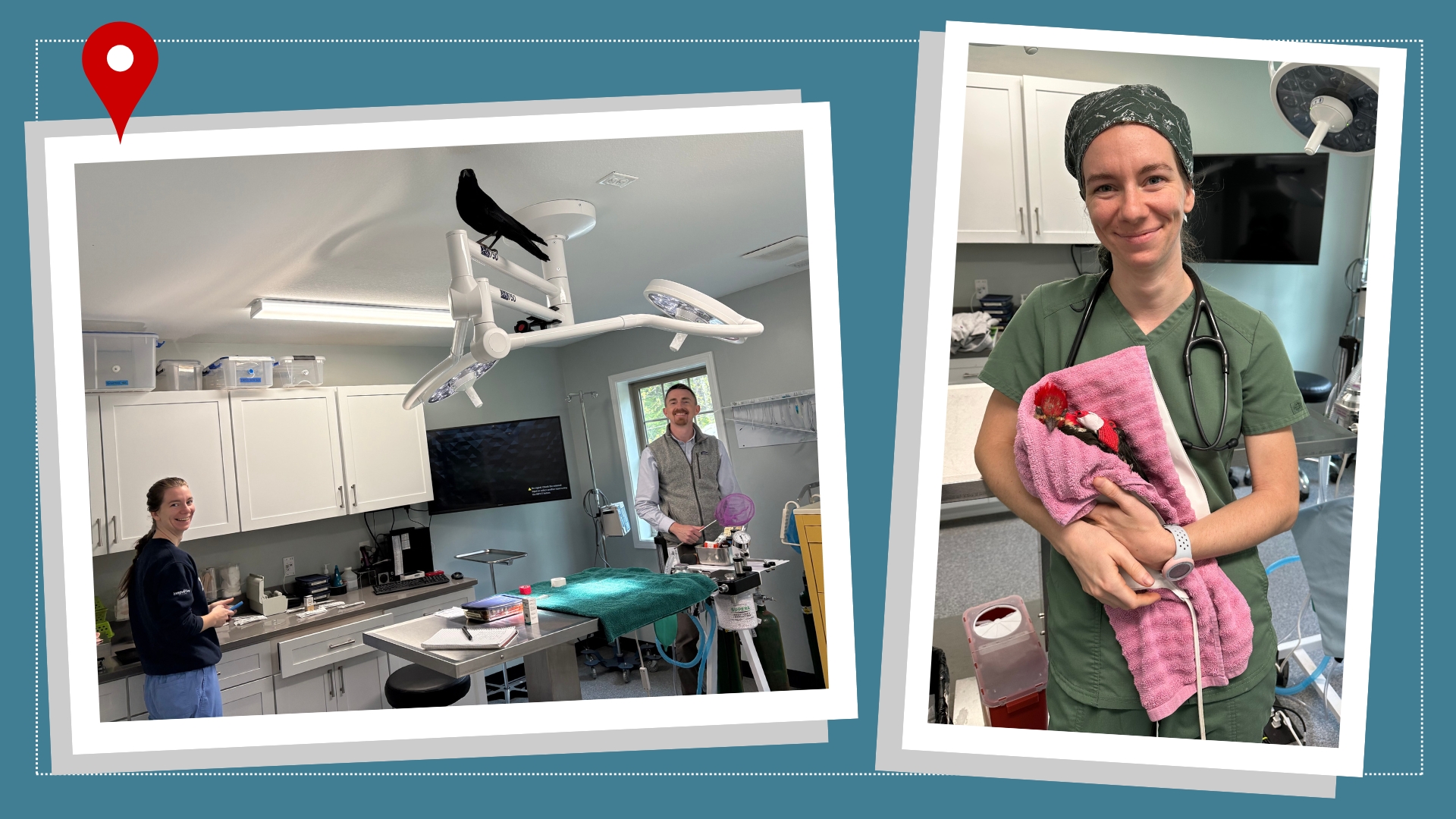Rural Scholars Take North Carolina’s Livestock Veterinarian Shortage by the Horns (and Hooves)
An NC State College of Veterinary Medicine program debuting this summer pairs vet students with livestock veterinarians in rural areas of North Carolina to build students’ skills, create connections and address a statewide care deficit.
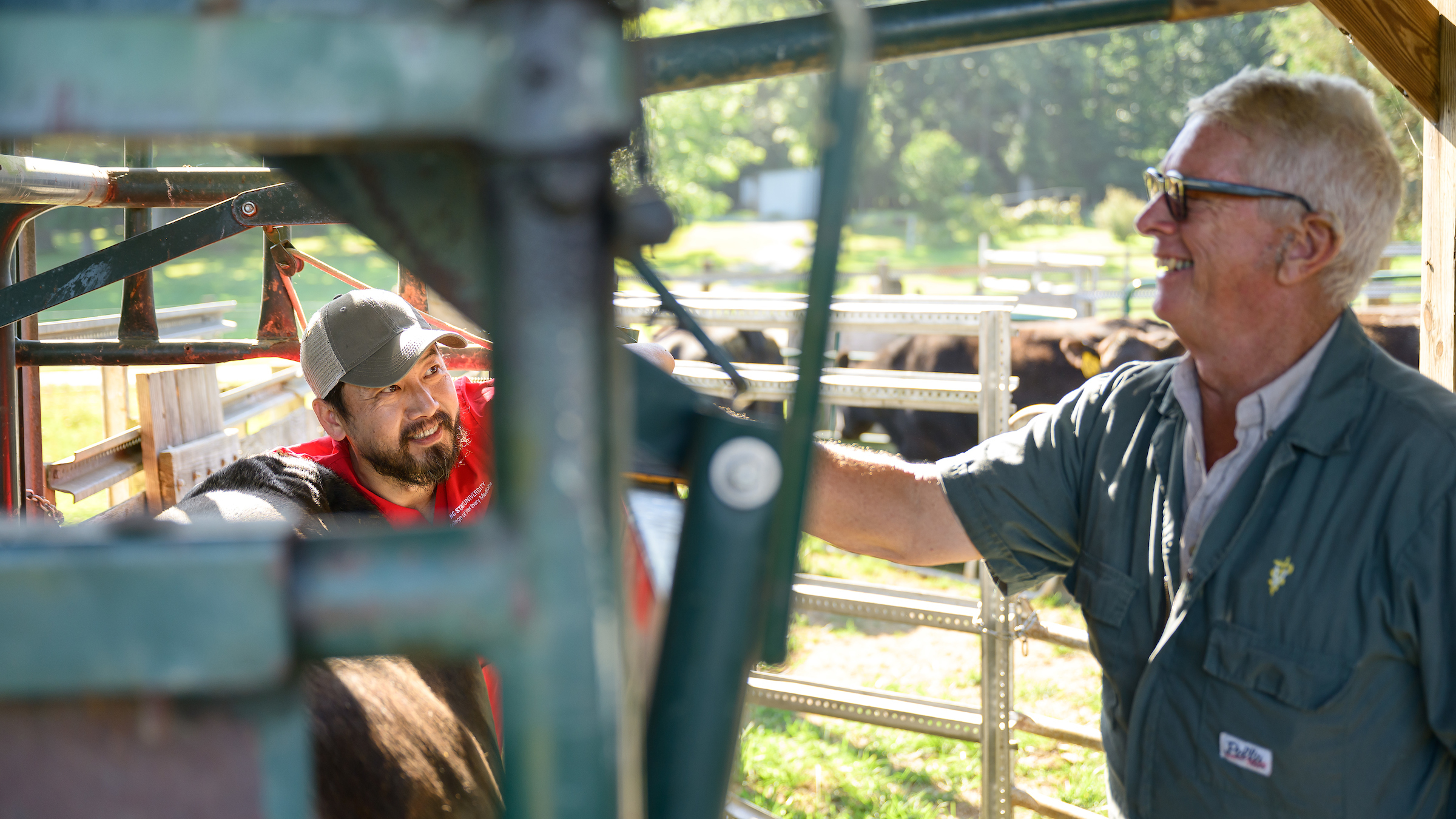
Standing in a Siler City corral with a couple dozen beef cattle, Seungshik Lee strides through the herd reading each animal’s ear tag, searching for specific numbers. Heat radiates off the bovines’ dark hides in the North Carolina summer sun, but he barely breaks a sweat.
The cattle warily eye Lee, a second-year student at the NC State College of Veterinary Medicine, and shuffle away at his approach. Undeterred, Lee identifies the cows he’s looking for and deftly herds them into a smaller pen, where he ushers them one-by-one into a cattle chute to vaccinate them for rabies and pinkeye and palpate them for pregnancy checks.
Dr. Richard Kirkman of Carolina Equine & Food Animal Mobile Veterinary Services leans against his work truck and watches Lee approvingly.
“At the vet school, you’re one of 120,” remarks Kirkman, a member of the college’s Class of 1991. “Out here, you’re one of one.”
This summer, Lee actually is one of six NC State scholars dispatched to farms and stables across North Carolina to work with partner veterinarians through the inaugural Randall B. Terry Jr. Rural Veterinary Scholars Program.
Modeled after the College of Veterinary Medicine’s research-focused Veterinary Scholars Program, the Terry Rural VSP provides rising second- and third-year veterinary students with individualized mentorship and hands-on experience in large and production animal medicine.
Students select two or three unique veterinary practices in rural areas and spend a few weeks at each over the course of the 10-week program. The majority of participants are working in counties that have a federally recognized shortage of food animal veterinarians.
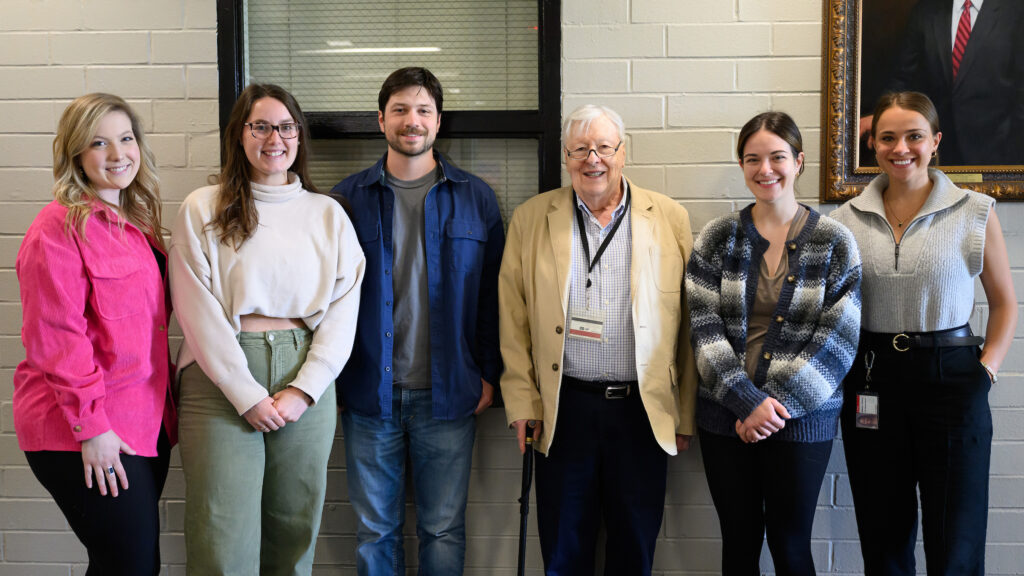
Twelve rural North Carolina counties spanning nearly 7,584 square miles are in desperate need of private practice veterinarians to care for the animals that produce North Carolina’s food, National Institute of Food and Agriculture designations show. Chatham County, home to Siler City, is on that list.
Nationwide, just 3.6% of practicing veterinarians worked in food animal medicine in 2023, compared with about 40% four decades ago, according to the American Veterinary Medical Association. A report issued by the Farm Journal Foundation last year projected that this number will continue to decline because there aren’t enough new graduates entering the specialization to replace retiring veterinarians.
“We’re supporting our students in filling this need within the field,” says Christian Jackson, Terry Rural VSP program coordinator. “Similar to what we do within the Food Animal Scholars Program, we’ve identified students who already have a general interest in practicing large animal medicine and are encouraging them to maintain that interest and providing opportunities that will allow for that.”
Dr. Kate Meurs, dean of the College of Veterinary Medicine, proposed the program, which is named after a longtime supporter of the college. It was initially designed for five students, but the applicant pool was so strong that the admissions committee added another spot.
Paid opportunities to work in large animal clinics are few and far between because rural practices generally don’t have the resources to fund veterinarians-in-training, Jackson says. NC State relieves clinics and students of that financial burden by providing Terry Rural VSP scholars with a $6,500 stipend and reimbursing them for applicable housing and transportation costs.
“In most paid opportunities, you can work as a technician at a hospital or as a lab assistant, but those don’t really give you the ‘doctor skills,’” says Jillian Petersen, rising third-year student and rural scholar. “This awesome program has a setup that gives me the ability to have an income and pay rent over the summer but also lets me do the things that I’m interested in.”
Dr. Cathy Mittenson, one of the veterinarians Petersen is shadowing this summer, graduated from the College of Veterinary Medicine in 2018. Mittenson, a veterinarian at Flat River Veterinary Hospital in Rougemont, frequently informally mentors students interested in large animal practice and is glad to see NC State expand experiential opportunities for these trainees.
“The value of programs like this is being able to see what practice is really like and what the need is,” Mittenson says. “Hopefully, students can recognize the value of being out in the field and seeing this life for themselves, doing this type of work and sticking with it. Just the exposure is really important.”
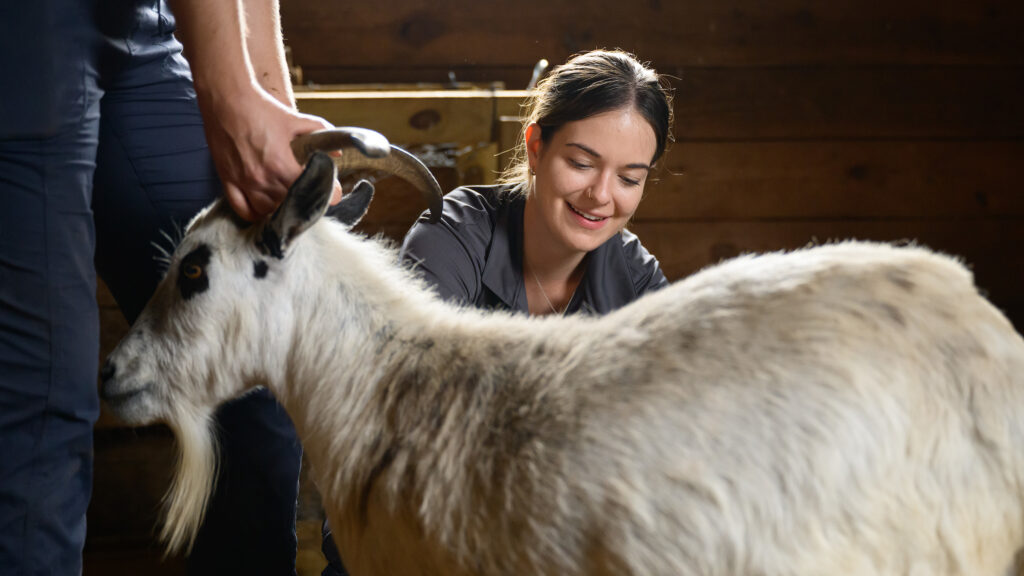
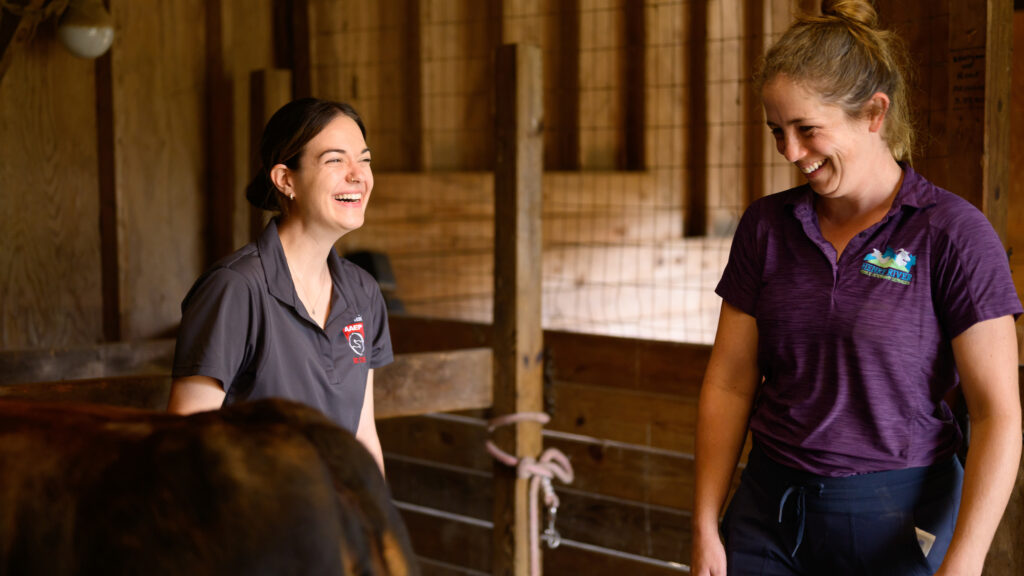
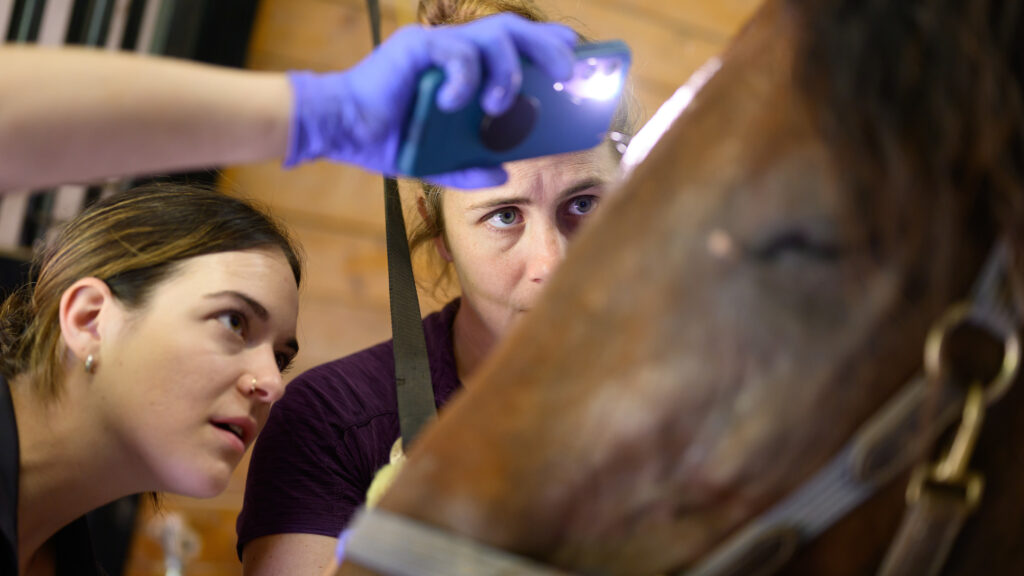
Home sweet homestead
Mimosa View Farm in Bahama, North Carolina, is a small but mighty homestead for 13 large animals — including cows, donkeys, goats and sheep — in addition to a flock of chickens, ducks and a turkey.
This Monday morning in late June, Petersen examines and vaccinates the farm’s resident ruminants, moving seamlessly between wrangling donkeys, dosing vaccine syringes and drawing blood from the cows’ tails.
“You’re getting your practice in,” Mittenson says to Petersen as the two cooperate to tie up dairy cow Gracie in a stall.
Kimberley Williams, the farm’s owner, has relied on Flat River’s veterinarians since she started her farm in 2016. Though she says she has never had issues calling in livestock vets when she needs them, the community’s growth is stressing a finite resource.
“I think this is an excellent program, especially with the development of the city,” Williams says. “I know more and more of my peers, and colleagues my adult children’s age, who are buying property rurally and who are interested in some sort of livestock. People are just able to enjoy home life more, and the veterinary access just needs to be there.”
Part of the reason why young veterinarians pursue other specializations is the lifestyle. Many livestock veterinarians work long hours treating large herds and traveling between farms. They also often have overnight and weekend duties for emergencies.
In addition to expanding Petersen’s clinical skills, the Terry Rural VSP is showing her how different practices are addressing these workforce issues and improving the work-life balance for the next generation.
For example, Petersen says the first clinic she worked with, Foundation Equine Clinic in Southern Pines, schedules earlier appointments to free up veterinarians’ evenings.
“A lot of the large animal practices that I have externed with, and doctors that I’ve talked to, have made this mindset shift a focus of their practice,” says Petersen, who hopes to enter equine medicine but also see ruminants. “This program has really helped to highlight some of the things that I value and things that I now know to look for when I’m searching for jobs.”
The morning’s Mimosa View Farm visit features another reward of rural practice. As Mittenson and Petersen pack up their truck, Williams pulls them into hugs and thanks them profusely.
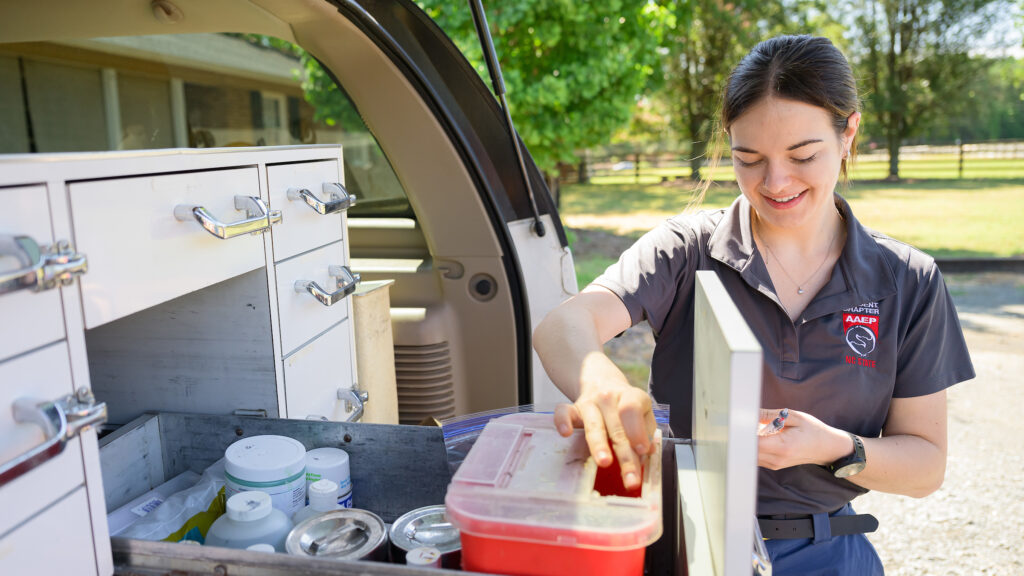
‘Exactly what I want to do’
Lee has gotten his hands dirty plenty of times this summer, from transrectally palpating Kirkman’s cows in Siler City to pulling a 6-inch stick from a Greenville area horse’s nose, but he can’t picture himself anywhere else.
“This program is exactly what I want to do,” he says. “I’m a little bit older than the typical vet student — I spent 20 years in the military. I don’t have the restrictions other vet students may have. I have no kids, I’m retired and have a little bit of pension, so I’m more financially stable. Why not go out in the field again? I want some land, I want a quiet life, and they need some help.”
He began the Terry Rural VSP with four weeks at the Greenville Mobile Equine Service doing a little bit of everything over the practice’s nine-county service area. There, he worked 40-hour weeks and responded to the occasional overnight emergency call.
Lee’s six-week schedule with Kirkman is longer: A typical day starts about 6:30 a.m. and could run until 6 p.m., but that’s life at a single-vet rural practice. He got a taste of that lifestyle while shadowing Kirkman last summer and has gotten only more comfortable with it as he takes on additional responsibilities.
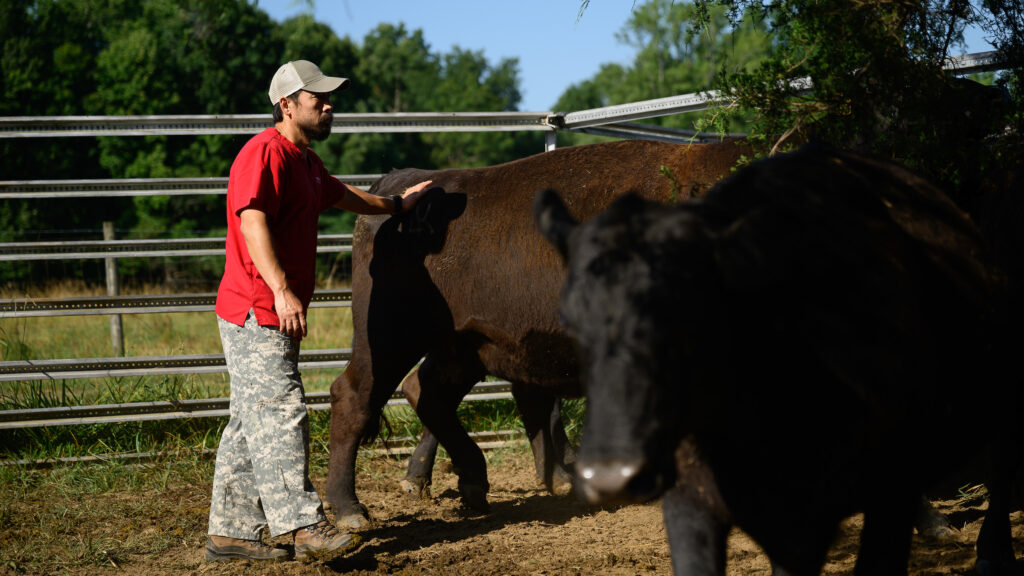
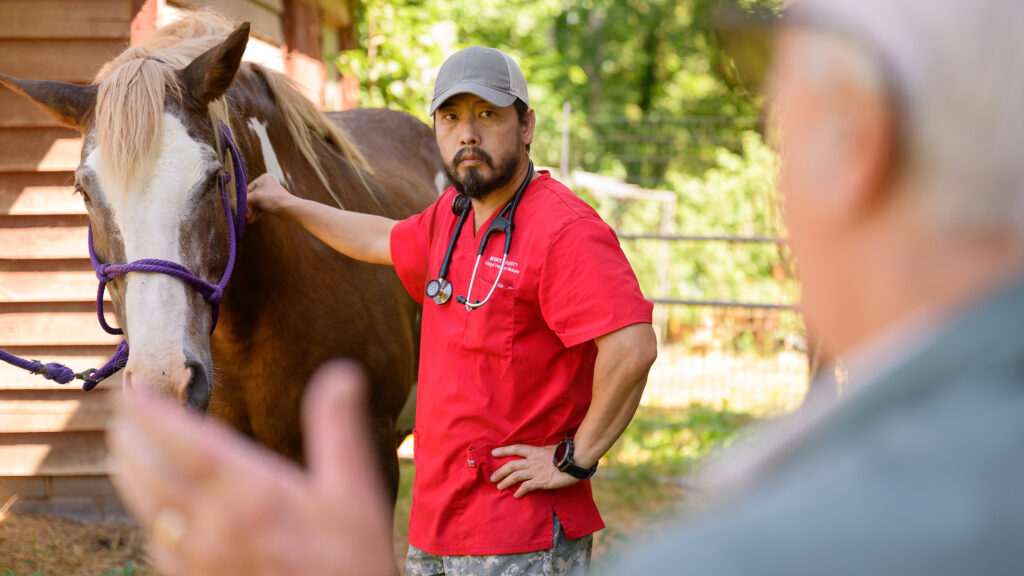
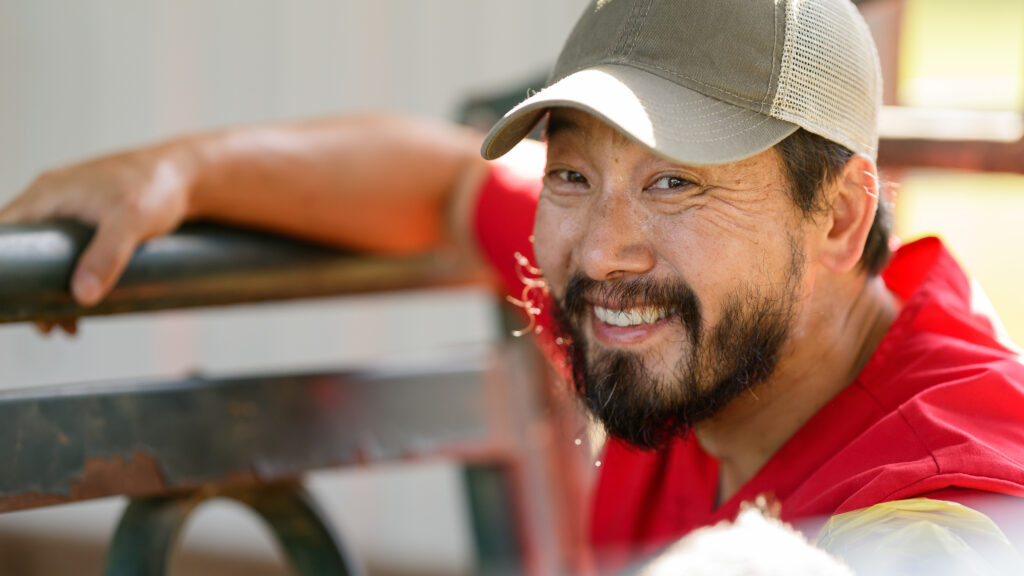
After Lee herds the last of the cattle into the field, he jumps into the passenger seat of Kirkman’s pickup truck and the two drive to Dr. Jean Handy’s home in Pittsboro. Handy, a retired associate professor of microbiology and immunology at the University of North Carolina School of Medicine, welcomes them at the gate to her backyard farm.
Lee vaccinates her draft horse, Peach, and checks that Peach’s eye has healed from previous inflammation. Then he chases Handy’s uncooperative goat, Agnes, into the barn for her annual rabies shot.
“That was masterful,” Handy says of Lee’s goat-handling ability. “I’m very impressed.”
Lee says moments like this, when he earns the community’s trust through Kirkman, are another highlight of the program. Building these relationships has persuaded him to start his veterinary career in rural North Carolina after graduation.
“Coming to new areas, it’s helpful to already have someone who takes you under their wing, so to speak,” Lee says. “I think that’s really important for large animal practice.”
Kirkman has mentored dozens of veterinary students during his three decades in the field, but many ultimately decided that livestock medicine wasn’t for them. He says his concerns for food safety and security have risen as livestock numbers climb and the ranks of practicing rural vets fall.
Programs that get students involved early and connect them to supportive environments are key to reducing that discrepancy. From Kirkman’s perspective, initiatives that have community buy-in on state and local levels, like the Terry Rural VSP, make the biggest impact.
“The solution is multifactorial,” Kirkman says. “Everybody’s got a role in making that happen, from the dean of the vet school to the North Carolina Legislature. Every one of them has a stake.”
“This program is a good first step,” Lee adds. “I appreciate that CVM leadership recognizes the need to support the students who want to go out into these rural areas.”

